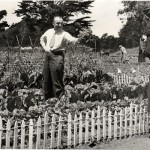In San Francisco the value of recycling is now becoming as common place as knowing that human industrialization effects climate change. Now through the city’s recycling and composting program businesses, apartment buildings and homeowners receive incentives for actively managing their waste removal. That’s why you’re now seeing even more of those large blue, green and black containers throughout the city.
But recycling a 70 year old national government program in a new way is what San Francisco’s Victory Gardens has done. Suzi Palladino of San Francisco’s Victory Gardens recently spoke at Green Zebra, highlighted the fact that during World War Two 40% of San Franciscans were growing their own vegetables and fruit – through a national incentive program called Victory Farms. That’s 40% in land limited San Francisco! The national program was designed to ease demand for food, at a time when the country was re-directing massive food supplies to American military fighting around the world. It’s interesting to note some of the campaign material used during that time which showed how we could support our troops abroad. But none the less the idea that individuals are again being empowered to create and maintain their own backyard, rooftop and community eco farms is taking root particularly during these trying economic times.
New York City
In 2008 Victory Gardens in partnership with the city of San Francisco planted a functioning test pilot edible garden in front of City Hall which they managed for 3 months. The Victory Gardens program is where the ideas of natural living or “sustainability” as we now call it has real time application. With their help you can learn how to become an Urban Farmer and really learn how to get your green on. They can be reached at:wwwsfvictorygardens.org. You can also contact Garden for the Environment which is San Francisco’s Organic Demonstration Garden, offering weekly workshops on Organic Gardening, Sustainable Landscaping and Urban Composting, School Year and Summer Programs for Youth, and the Gardening and Composting Educator Training Program. Founded in 1990, the Garden for the Environment is a half-acre organic garden in San Francisco demonstrating small-scale urban organic food production, organic gardening, low water-use landscaping and urban compost systems.Contact at: info@gardenfortheenvironment.org.
 But what about the future of urban farming? Is verticle farming in our future? It’s predicted that by the year 2050, 80% of the world’s population will live in urban centers. As the global population swells and urban centers lose what little green space they once had, more countries are looking to urban farming to feed their people. The urban environment doesn’t have unlimited horizontal farming space, so the natural solution is to build up. Vertical farms can fit easily into the cityscape while providing a local source of food for inhabitants. Even better, they can be placed nearly anywhere that a building can go.
But what about the future of urban farming? Is verticle farming in our future? It’s predicted that by the year 2050, 80% of the world’s population will live in urban centers. As the global population swells and urban centers lose what little green space they once had, more countries are looking to urban farming to feed their people. The urban environment doesn’t have unlimited horizontal farming space, so the natural solution is to build up. Vertical farms can fit easily into the cityscape while providing a local source of food for inhabitants. Even better, they can be placed nearly anywhere that a building can go.
Verticle Farming
__________________________

